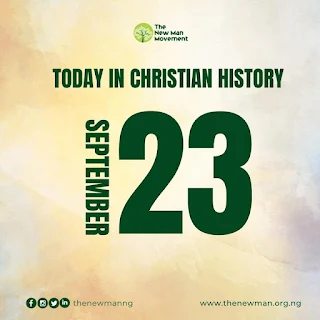September 23, 1595
Led by Fray Juan de Silva, the Spanish began an intensive missionary campaign in the North American southeast. In two years time, 1,500 Native Americans in what is now Florida, Georgia and South Carolina became Roman Catholics.
September 23, 1857
The 4th great Awakening began this day with six people in attendance praying.
American’s moral recovery began when Jeremiah Lanphier, a concerned layman, started a noon prayer meeting for New York businessmen. Only six people came to the first prayer meeting on September 23, 1857 on the third floor of the “Consistory” of the Old Dutch Reformed Church on Fulton Street. By spring daily prayer meetings sprang up in many locations and daily attendance grew to 10,000. America’s greatest spiritual awakening was underway.
September 23, 1931
The Apostolic Church arrived in Nigeria through missionary delegates from the United Kingdom: D.P. Williams, A. Turnbull, and W.J Williams. Their journey to Nigeria that year was in response to an invitation from leaders of the Great Revival in the Nigerian church.
The Apostolic Church Nigeria is a Pentecostal Christian denomination in Nigeria with its national headquarters at Olorunda Ketu, Lagos and international headquarters in Penygroes, UK.
September 23, 1857
Layman-turned-evangelist Jeremiah C. Lanphier holds a lunchtime prayer meeting for businessmen on Fulton Street in New York City. At first, no one shows up, but by the program's third week, the 40 participants requested daily meetings. Other cities begin similar programs, and a revival—sometimes called "The Third Great Awakening"—catches fire across America.
September 23, 1950
Timothy James Keller was born. He was an American Calvinist pastor, preacher, theologian, and Christian apologist. He was the chairman and co-founder of Redeemer City to City, which trains pastors for service around the world. He was also the founding pastor of Redeemer Presbyterian Church in New York City and the author of The New York Times bestselling books The Prodigal God: Recovering the Heart of the Christian Faith (2008), Prayer: Experiencing Awe and Intimacy with God (2014), and The Reason for God: Belief in an Age of Skepticism (2008).
Keller shunned the label "evangelical" because of its political and fundamentalist connotation, preferring to call himself orthodox because "he believes in the importance of personal conversion or being 'born again,' and the full authority of the Bible."
He identified with Calvinist theology, although he had been critiqued by some in that tradition for his interpretation of its doctrines. He was described as a "doctrine-friendly emerging pastor".


Post a Comment
Please drop a comment and use the Social Media Buttons below to share to friends and family.